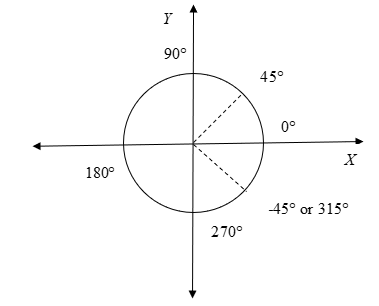Question
Question: Determine the value of \(\sec ( - {45^\circ })\) \({\text{(A) }}\sqrt {\text{2}} \) \({\text{(B)...
Determine the value of sec(−45∘)
(A) 2
(B) - 2
(C) 1
(D) - 1
Solution
First we must convert the negative angle to positive angle. We will first see where the specific angle lies in the angle graph and then use the appropriate formula to calculate the value.
Formula used: sec(θ)=cos(θ)1
cos(A+B)=cosAcosB−SinASinB
Complete step-by-step answer:
We know that sec(θ)=cos(θ)1
So we have to put the value of θ
⇒ sec(−45∘)=cos(−45∘)1

From the graph we can see that the angle −45∘ corresponds to angle 315∘.
Therefore, angle 315∘ can be written as a combination of 270∘+45∘
Therefore, the question can be rewritten as:
⇒ sec(315∘)=cos(315∘)1
This could further be written as:
⇒ sec(270∘+45∘)=cos(270∘+45∘)1……………….(1)
Now let’s consider cos(270∘+45∘)
We know that cos(A+B)=cosAcosB−SinASinB
Therefore, the problem could be expanded as:
⇒ cos(270∘+45∘)=cos(270∘)cos(45∘)−sin(270∘)sin(45∘)
Now from the trigonometric table that:
cos(270∘)=0,
cos(45∘)=21,
sin(270∘)=−1,
sin(45∘)=21.
On substituting the values, we get:
⇒ cos(270∘+45∘)=0×21−(−1)×21
On simplifying we get:
⇒ cos(270∘+45∘)=21.................(2)
Now on substituting the value (2) in equation (1)we get:
⇒ sec(270∘+45∘)=211
On simplifying we get:
⇒ sec(270∘+45∘)=2
Hence sec(−45∘)=2 is the required answer.
∴The correct answer is option (A).
Note: A negative angle is an angle which is traced clockwise from 0∘, therefore at that same point when traced anti-clockwise, would be another angle which is the same angle but positive.
In these types of questions, the various trigonometric formulas should be remembered such as the angle formulas and the sum and difference identities should also be remembered.
A graph should be made to visualize the angle on which the calculation is to be made.
There directly won’t be sum and difference identities for sec\theta, cosec\thetaor cot\theta so therefore they should be converted into their respective identities and the formulas should be then applied. Thereafter it should not be forgotten to convert the solution back to the original format because not converting it would result in an incomplete answer.
